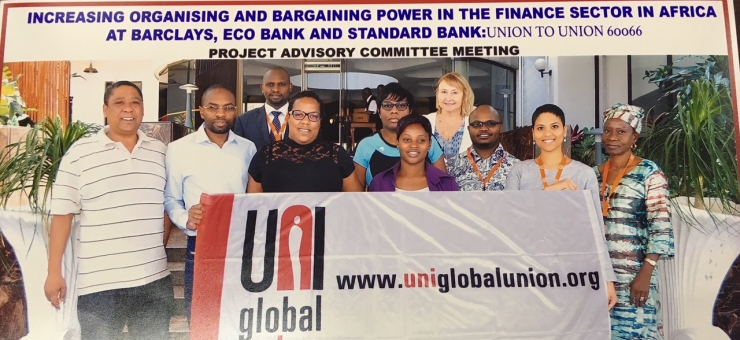Increasing union density and collective bargaining power in the Finance Sector in Africa

On 6-7 March 2017, the Project Advisory Committee of the Union to Union funded project "Increasing Organising and bargaining power in the Finance Sector in Africa at Barclays, ECO and Standard Bank" met to kick off the actvities for the year.
Union leaders from Kenya, Burkina Faso, Zimbabwe and Namibia met to discuss the stategy to reach the objectives of increasing union density and collective bargaining power in the Finance Sector in Africa, and in particular how to increase trade union capacity in organising as well as establish cooperation amongst unions in the target companies.
At least sixty male and female Shop Stewards and activists will personally benefit from improved organising, recruitment and planning skills in the framework of the project. They in turn will train shop stewards and activists and together, they are more likely to have successful outcomes in their workplaces. These transferable skills will not only increase their confidence, but be used in other areas of their life too. These men and women will also benefit from having the opportunity to discuss gender issues and female members of the union will benefit from the political space/opportunity, through their participation in organising workshops and working with their male counterparts to progress gender equality within their unions.
This project strategy is aligned with the UNI Global Union Breaking Through strategy adopted at the Nagasaki Congress held in 2010 and confirmed at the Cape Town Congress held in 2014. The Breaking Through strategy gives expression to UNI Global Unions’ mission, i.e. to build power for working people in UNI Sectors through the growth of unions and expansion of collective bargaining to improve the working and living conditions for workers and support the equitable distribution of wealth, decent jobs for all and sustainable economic growth. The abovementioned strategy also conforms with the UNI Global Union 40 for 40 campaign, which is aimed at increasing the empowerment of women and at enabling women to take up leadership positions within UNI and her affiliated Unions.
The finance sector has been traditionally dominated by the male workforce, especially at management levels. With the increased access to education and training and the urbanization of the workforce in Africa, more and more women have been able to be employed by large banks. However, female workers are still under-represented at management levels, especially for the top management, and tend to be less paid than men for the same level of qualification and responsibility. Some recent studies have clearly demonstrated that the banks in which more women had access to more responsibilities had a more sustainable business model, as women tend to take less risks on financial markets and provide quality advice to their customers on the long term.
In this project, specific attention is paid to gender equity, mainly through the following aspects:
- In each project activity target unions will be required to include at least 40% women activists.
- Target unions will also be tasked to ensure that gender issues are discussed during the issue based organising workshops to ensure that when activists embark upon organising campaigns, they are able to reach out to women workers.

